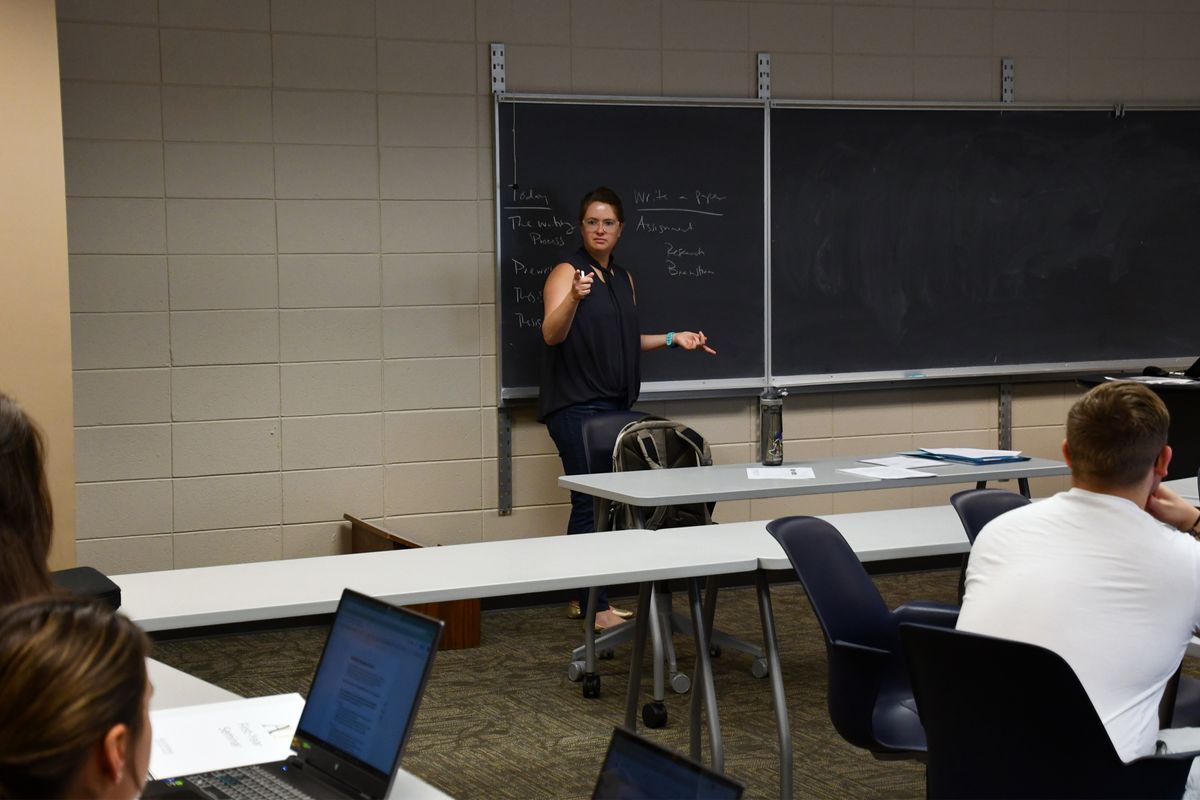AI at AU: Professors create generative AI policy

As generative artificial intelligence like ChatGPT gains popularity among university students, English Professor Sarah Rude knew the discussion for and against AI usage in the classroom wasn’t so black and white.
Other professors in the English Department agreed.
After its launch in late November 2022, ChatGPT has become a growing concern in academia, particularly in its ability to replicate human speech patterns through text, which leads some students to academic dishonesty.
Together, Rude and her English department colleagues Daniel Gerling and Beth Boyens are drafting Augustana’s first generative artificial intelligence policy, which would place restrictions on the use of generative AI in W-component and first-year seminar classrooms.
The trio are also proposing an update to the campus-wide honor code.
As it reads now, the honor code defines plagiarism as taking someone else’s work and passing it off as your own. Gerling says the clarification will acknowledge that AI is not a “someone,” but that passing off AI generated language as your own is still considered plagiarism.
The Undergraduate Curriculum Council oversees all curriculum-related changes and must approve changes, additions or reductions of new academic programs and policies. The UCC will vote to approve or deny the policy and change to the honor code once Rude, Gerling and Boyens have finalized it.
Until then, the university has not approved a campus-wide policy regarding students’ use of AI.
Rude, Gerling and Boyens start the policy with a statement about the importance of writing for learning.
“Stopping everything, thinking critically and writing builds identity, helps you to remember facts, helps you articulate your thoughts, and makes something intangible in your head come out on the page,” Rude said. “Then we address the fact that AI can thwart all of those great, wonderful things about this mode of learning.”
However, Rude said she and other faculty recognize AI’s presence and usefulness while simultaneously noting that there are ethical ways to use it.
With generative AI’s rise in popularity, some university faculty became worried about what it will mean for the future of students and learning.
“A panic set in,” Gerling said. “The things we are teaching are being replicated by AI.”
Instead of fearing how AI could impede learning, Rude decided to take the challenge head-on.
Along with the creation of new AI policies, President Stephanie Herseth Sandlin said the university’s leadership team is also taking measures to consider AI’s role in academics.
“The leadership team is doing a baseline audit of where AI is already being integrated,” Herseth Sandlin said.
From there, the group will evaluate which policies need to be adjusted and where.
“There may be different challenges in [different] disciplines, so we want to retain that element of discretion.” Herseth Sandlin said. “We also don’t want to rush it. We want to get it right.”
Gerling sent out an email on Aug. 14 to Augustana faculty with the English professors’ newly drafted policy. Most of the faculty had already learned a bit about AI from Rude, who presented to the College of Arts and Science in the past spring semester on the many innovative ways one can use AI.
Still, debate over AI continues on campus. Even within the English and journalism department, not every professor agrees when the line of plagiarism starts.
Rude believes ownership of ideas comes from the brainstorming and drafting phases. Gerling believes using verbatim language without quotation marks qualifies as plagiarism. Others believe any use of AI during the writing process is plagiarism.
On the other side of campus the conversation on AI is currently on hold within the biology department, Lisa Baye, department chair of biology, said.
“Right now it’s not a problem,” Baye said.
Because science writing relies so heavily on citations, plagiarism by generative AI is relatively easy to catch, but Baye believes that citations will soon become commonplace for text-generating AI.
“That’s when it becomes a problem,” she said.
As the director of the Nancy Dickinson Writing Center and the chair for all W-component courses offered on campus, Gerling is especially worried about students losing their writerly voice – the individuality writing takes on from the author’s style and training.
“When we read the stuff [generative AI] produces, we realize that we don’t want to produce students that can write boring crap like it does,” Gerling said.
Rude also believes the writing process is important for student’s education, but she thinks AI can be used to benefit student writing.
“ChatGPT can get you past some of the pain of outlining and get you to the writing part faster,” Rude said.
Sydney Rogers, a second-year math and secondary education major, thinks that although it may be useful, AI does not produce authentic writing.
“AI is an emerging force, especially in the writing and educational world, but in an educational setting, it really has no authenticity,” Rogers said.
Herseth Sandlin said she believes that if a student is to be dishonest, they are “diminishing the return of investment” of their own education.
“We expect people to be leaders in their professions and to learn from it and with it together with faculty rather than trying to just do the shortcut and get an easy A. It’s just so shortsighted,” Herseth Sandlin said.



